[CS Technical Interview 2] Operating Systems That Click
yiyj10305235
A course that helps you understand core operating system concepts and practice explaining them verbally for interviews
입문
Operating System, Tech Interview, computer-science
A course that helps you understand core network concepts and practice explaining them verbally for interviews
186 learners
Understanding Core Network Concepts
The ability to explain things verbally in technical interviews
Practical Workbook PDF Preparing for Follow-up Questions

As a non-major, when I first prepared for developer employment, I was obsessed only with algorithms and coding tests. I gained some confidence and passed most coding tests. However, I kept failing at technical interviews, which was the next hurdle.
What was the problem? It was the lack of CS (Computer Science) knowledge. In interviews, CS fundamentals were considered much more important than algorithms.
Even after filling in my CS fundamentals, interviews weren't easy. At a certain company's interview, I was asked about floating-point numbers. It was content I had definitely read multiple times in books and thought I understood, but I couldn't utter a single word. That's when I realized it. Passive learning through simply reading and understanding wasn't enough to answer questions in real situations.
To succeed in interviews, you need not only to accumulate a lot of knowledge but also the ability to explain this knowledge. This 'ability to explain' can only be developed through practicing to organize concepts in just a few sentences and articulate them out loud. Through this process, you can also discover what you didn't know precisely. Without sufficient practice, you'll encounter the following problems.
1. Conceptual Confusion Type
❓Interviewer What are the characteristics of object-oriented programming?
💬 Candidate The SOLID principles. First, S is..(omitted)...This is a case of confusing similar concepts.
SOLID is an OOP design principle, while the characteristics of object-oriented programming are abstraction, encapsulation, inheritance, and polymorphism.
The moment you mix up related concepts, the interviewer judges that 'your fundamentals are shaky.'
It's not just a simple mistake, but rather it's read as a signal that your conceptual framework is not solidly established.
❓Interviewer What are the characteristics of TCP?
💬 Candidate It's a protocol that guarantees reliability.
❓ Interviewer What are the mechanisms that guarantee reliability?
💬 Candidate Uh... well... it ensures safe transmission... like that...This is a case where you only know the What, but the How/Why is missing.
You only know the superficial answers and aren't prepared to explain the underlying principles.
TCP establishes communication through connection (3-way handshake), ensures reliability through RDT (sequence numbers, ACK, retransmission, etc.), and maintains quality through flow control and congestion control.
These concepts should be connected as one coherent flow in your mind. Without organizing concepts concretely, you cannot prepare for follow-up questions.
❓Interviewer What is HTTP?
💬 Candidate Um... it's for sending and receiving data on the web... something like that...?It's such a familiar concept, but when asked to explain it in one sentence, the words don't come easily.
Words like request, response, server, and client come to mind, but they don't flow naturally into a coherent sentence.
This is because we've never practiced explaining from definition to principles in one continuous flow.
This isn't a lack of knowledge, but an absence of structure.
Non-majors · Job seekers · Career changers and others who are preparing for technical interviews and need to be able to articulate CS fundamentals verbally
A major student who needs to reorganize again

I've studied it before, but
I can't bring myself to reorganize all that vast amount of CS knowledge again
Don't open those thick textbooks
again.
We'll organize only the essentials clearly.
Non-CS majors who find CS overwhelming

This is my first time preparing for a technical interview
and I don't know where
to start - I'm feeling overwhelmed
By following the roadmap, you can
focus on learning only
the core CS concepts.
Job seekers with no time

Enough, I don't have time.
I need to quickly review only the CS topics
that come up in interviews
You can quickly review on your own with
lecture materials and
interview chapters available.
1⃣ Short and highly focused runtime
With a comfortable lecture duration, you can complete the course even with a busy schedule and quickly review right before interviews.
Compressed to the essentials, designed so you can complete the entire course in a short amount of time
I focused on the point that the biggest learning effect comes from completing the course itself, rather than accumulating courses like shopping.
2⃣ Interview-focused lectures summarizing only the essentials
I have compiled and organized the essential concepts and principles that must be reviewed before interviews
I structured it to build fundamentals while ultimately being usable for interview preparation
It's not just a simple summary, but structured with diagrams and easy explanations so that even non-majors can fully understand it.
You can quickly organize the main content while learning with a clear understanding of why it's important.
3⃣ Appendix [Interview Practice] Included
In interviews, the ability to explain things clearly is much more important than simply knowing something.
However, organizing and practicing on your own is not easy and is a tedious task.
At the end of the lecture materials, we include "answering in one or two sentences" training to reduce the effort of summarizing.
"How can I maximize my learning efficiency even more?"
"Will this course alone really be enough for speaking practice?"
After much deliberation, the Technical Interview Practice Workbook was born.
You can train as if in a real interview by speaking out loud.
This is a file provided separately from the lecture materials,
and it focuses on enabling you to express
what you understand in your own words.
Curious about the workbook structure or how to use it?
You can check it out in detail right now in the workbook introduction video at the beginning of the course.
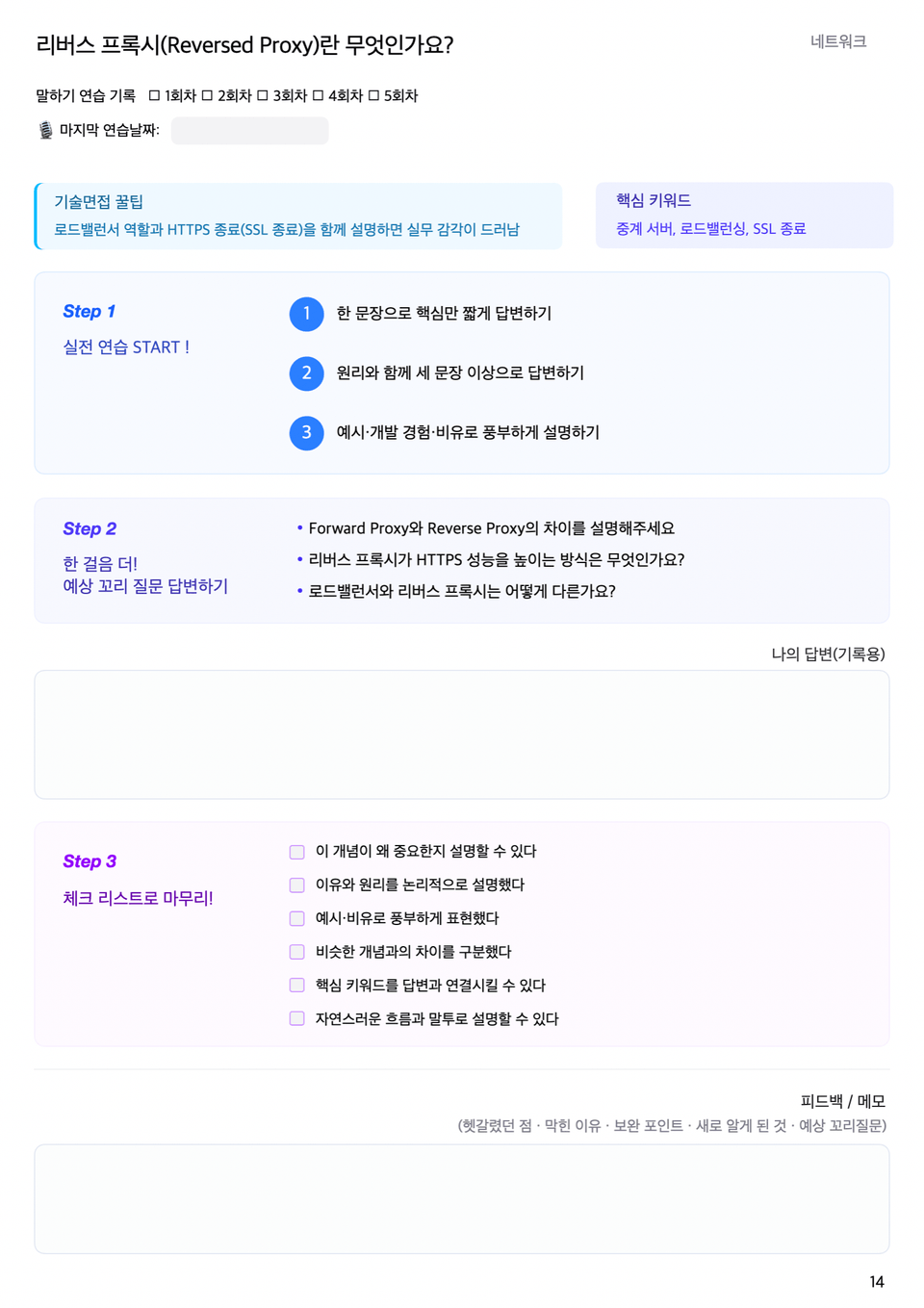
Workbook PDF Preview
1⃣ Download the materials and learn key concepts while listening to the lectures.
2⃣ Take notes on important parts to create your own CS interview notes.
3⃣ Save them on your phone and review them briefly whenever you have time.
If you're facing an interview and
don't have much time → Use the appendix [Interview Practice] in the course materials to quickly sharpen your interview skills.
If you have time → Complete your speaking practice like a real interview with the Technical Interview Practice Workbook.
This course is short, but it's 'not shallow'.
We've compressed vast content to organize only the core essentials that are actually asked in interviews.
We've removed unnecessary theory and cover topics deeply enough to answer follow-up questions.
If you want to use your limited time most efficiently, the short runtime will actually become your most powerful weapon.
I started as a non-CS major and understand better than anyone the thirst for fundamentals (CS knowledge, programming languages, etc.). Through self-studying countless materials and building my own know-how, I eventually graduated from Seoul National University and now work as a 🧑🏻💻 Kakao developer.
From a young age, I was more confident than anyone in combining and reconstructing various materials to create my own 'comprehensive study notes.' This course is precisely that secret notebook born from my 'ultimate self-study know-how' and all my passion and philosophy.
🔥 What makes this course special?
All of my 'know-how' is included: As a non-CS major, I have fully incorporated my experience and know-how of self-studying CS and programming languages and getting hired at a large corporation. I have included in this course all the methods for how to most efficiently understand complex and abstract concepts and make them your own.
'Fundamentals' are key in any development field: Whether you're aiming for game development, AI, web/app development, or any other field, basic knowledge of computer science is not optional but essential. This course helps you become a true expert based on solid fundamentals.
We compete with 'overwhelming quality': I've referenced countless materials including textbooks, famous university lectures, commercial books, and technical interview resources to extract core keywords and reconstruct them in my own unique way. With intuitive diagrams and illustrations, plus easy explanations infused with my practical experience, I promise to make even complex concepts click with that "Ah, now I get it!" moment.
Networking is a subject that developers must understand at some point, but it often feels like a wall from the very beginning for many people.
OSI 7 layers, TCP/UDP, NAT, DNS, HTTPS... The terms are familiar, but you can't quite grasp the flow of how everything connects from start to finish❓
If you find it overwhelming to explain exactly what happens when you enter a URL in a browser during an interview❓
TCP connections use 3-way handshake, so why does disconnection use 4-way❓
Or are you already exhausted from the start because there are too many words to memorize❓
This course is designed specifically for those people, clearly organizing concepts by connecting them based on actual internet communication flow according to the OSI 7-layer structure. Rather than a fragmented list of concepts, it's structured so you can grasp the context in which concepts appear in the order that data moves between client and server, so there's no more confusion!
How does the internet work?
→ Introduces the overall flow through LAN and WAN, data transmission methods, and OSI 7-layer structure.
What happens when you enter a URL in your browser?
→ Explains DNS, IP, HTTP, TCP/UDP, and port numbers in order.
What is the difference between TCP and UDP?
→ We organize the structural differences through the presence or absence of reliability, flow control, and congestion control.
Why is NAT necessary?
→ We explain the private IP and public IP structure, NAT operation methods, and practical applications with diagrams.
How does HTTPS encrypt communication?
→ We'll break down the concepts of symmetric/asymmetric keys and the TLS handshake process in an easy-to-understand way.
How is network security implemented?
→ Understand the basic protection structure through firewall, SSL/TLS, and encryption elements.
You can now practice answering core questions that frequently appear in technical interviews, such as "Please explain the difference between TCP and UDP" and "What is DNS?", by training yourself to respond fluently in one or two sentences without hesitation.
This is the table of contents and key keywords you will learn in this course.
If there are any unfamiliar keywords, make sure to master them thoroughly with this opportunity.
Network Fundamentals
Network definition and configuration, LAN and WAN,
Data transmission methods,
OSI 7 Layers and TCP/IP Layers
Application Layer
HTTP,
DNS
Transport Layer
TCP and UDP, 3-Way Handshake,
RDT protocol,
TCP Flow Control / Congestion Control
Network Layer
Router, IP, Subnet Mask,
NAT,
DHCP
Data Link Layer
Ethernet, CSMA/CD,
Switch,
MAC address,
ARP
Overall Network Flow
Client-Server Data Transmission Process
Network Security and Practice
The three pillars of security,
Symmetric keys and asymmetric keys,
HTTPS, SSL/TLS,
Firewall, VPN, Proxy, CDN, CORS
[Appendix] Interview Practice
Review the main concepts once more in a Q&A format
Conceptual organization by layer according to the OSI 7 layers
Learning focused on the actual flow of data moving from client to server
Understanding when key concepts like LAN/WAN, DNS, HTTP, TCP, IP, NAT appear
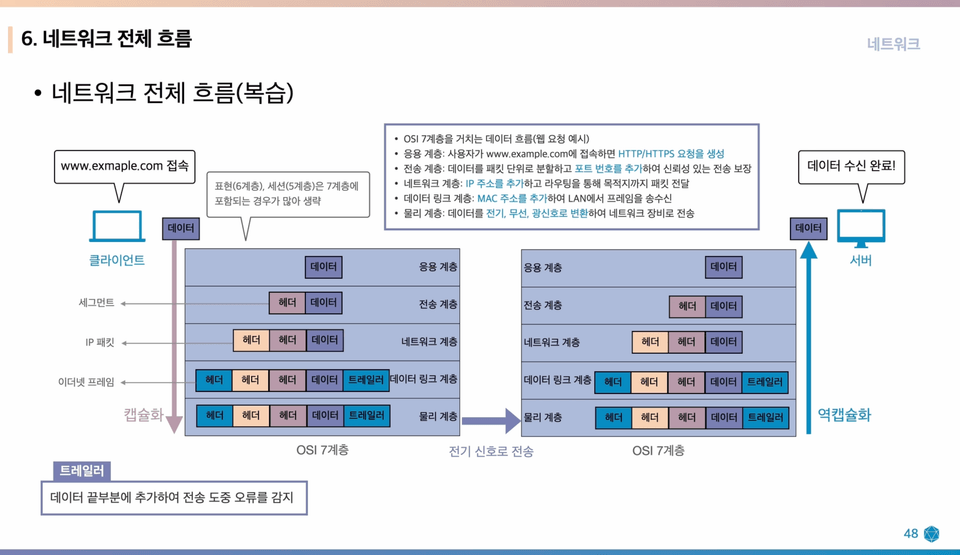
Network Overall Flow Explanation
It helps you easily understand and remember complex and unfamiliar network terminology for a long time through intuitive diagrams and visual materials rather than simple memorization.
You can clearly understand the core principles of concepts such as TCP 3-way handshake, 4-way handshake, NAT operation method, and TLS handshake through diagrams.
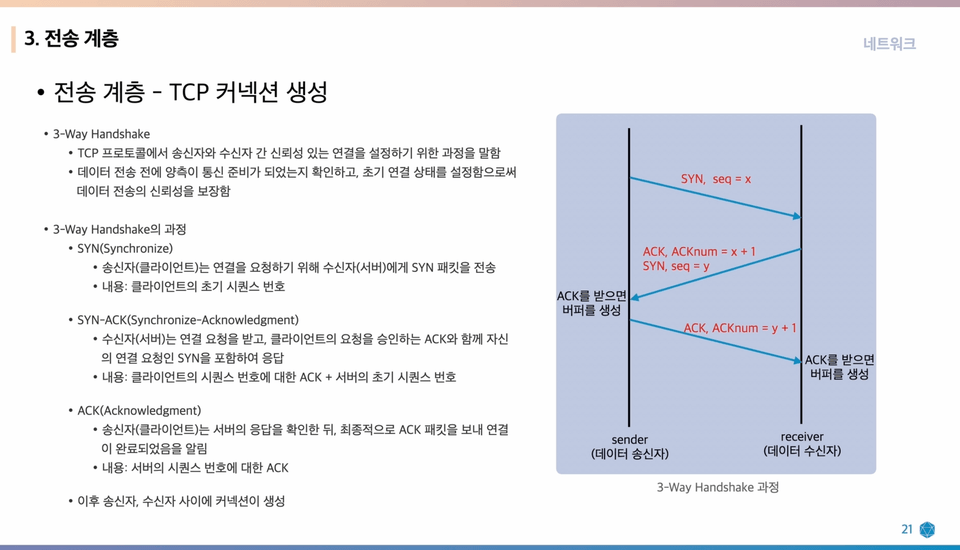
TCP 3-way handshake process

NAT Concepts and Principles
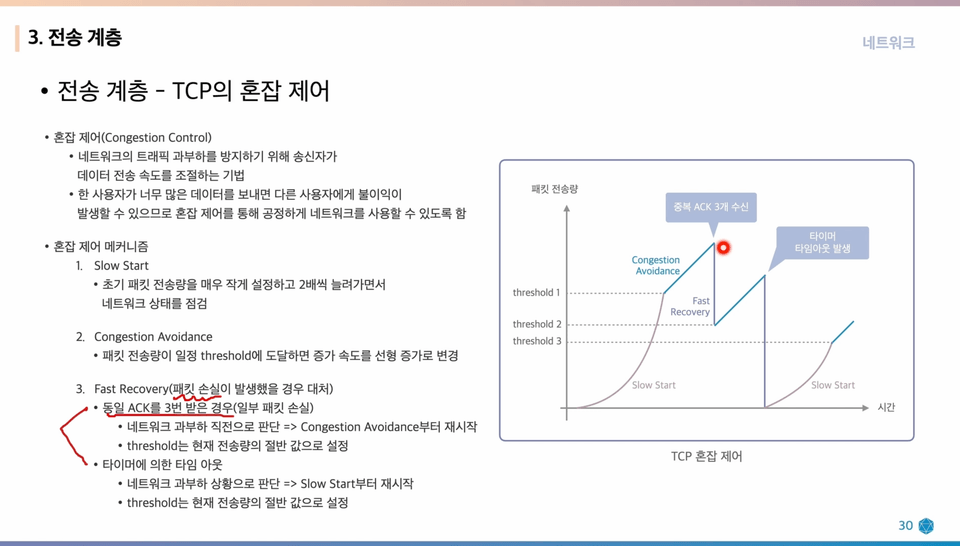
TCP's Congestion Control Algorithm
HTTP/HTTPS, symmetric/asymmetric keys, IP, DNS, TCP and other core network concepts that developers most frequently encounter and need to understand when developing web services and applications are covered in depth.
Explains how each concept actually works in real communication processes and what roles and importance they have with practical examples to strengthen practical capabilities beyond theory.
Through this, you can solidly build the foundational knowledge needed to identify causes and seek solutions when network-related problems occur.
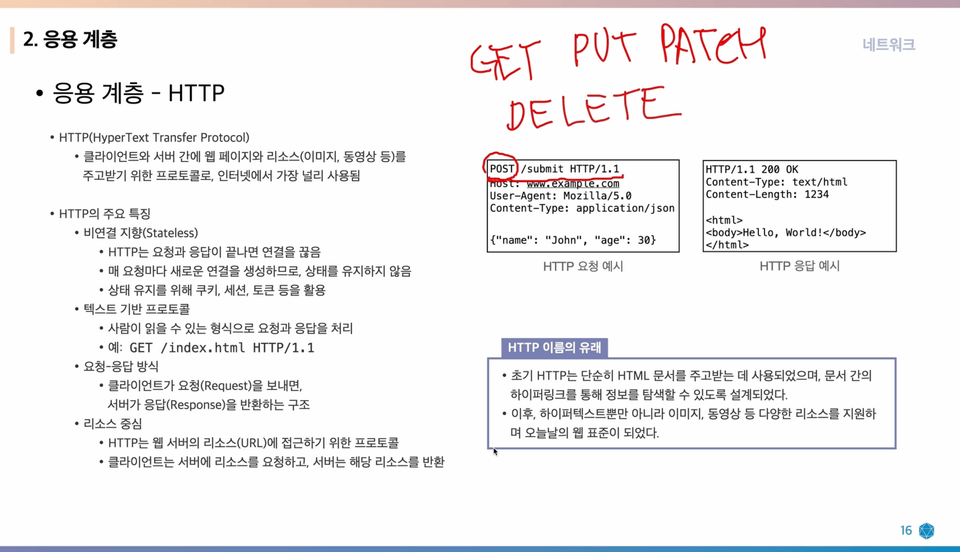
HTTP explanation
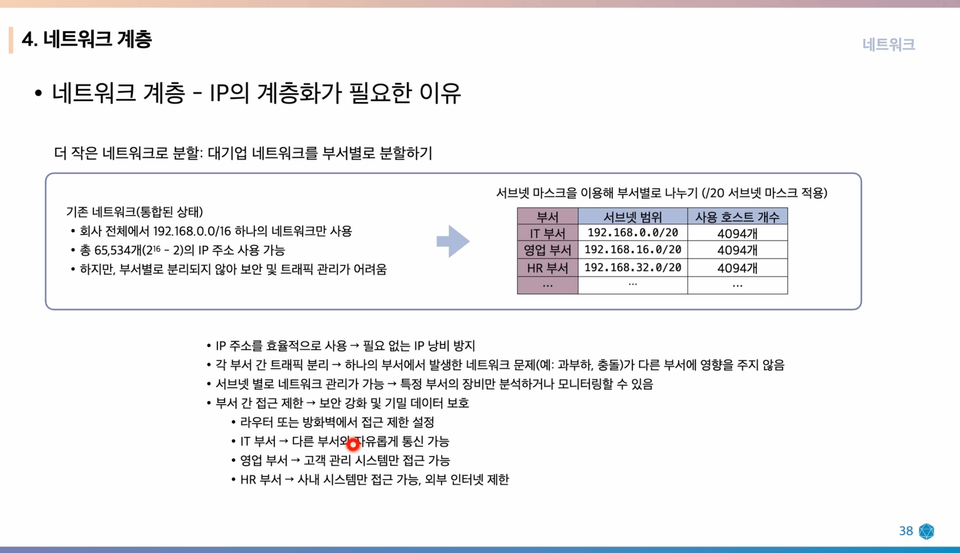
Reasons why IP layering is necessary
Training your ability to explain practical questions like "What's the difference between TCP and UDP?" and "How are IP addresses assigned?" in just one or two sentences
Summary organized by level with common interview questions + interview practice chapter included
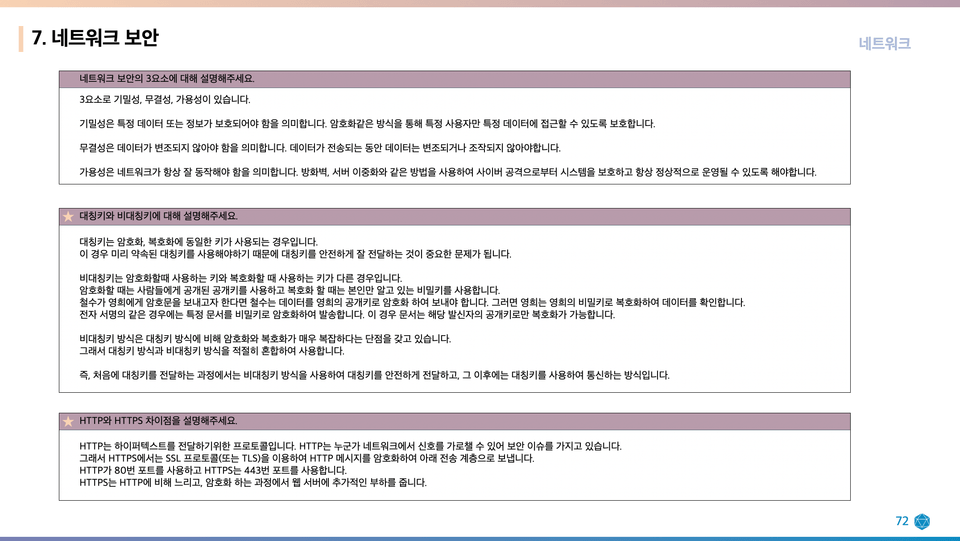
Network Security Core Questions Summary
If the video is frozen, please refresh the page :)
Explanation of the overall network flow
Explanation of TCP's RDT
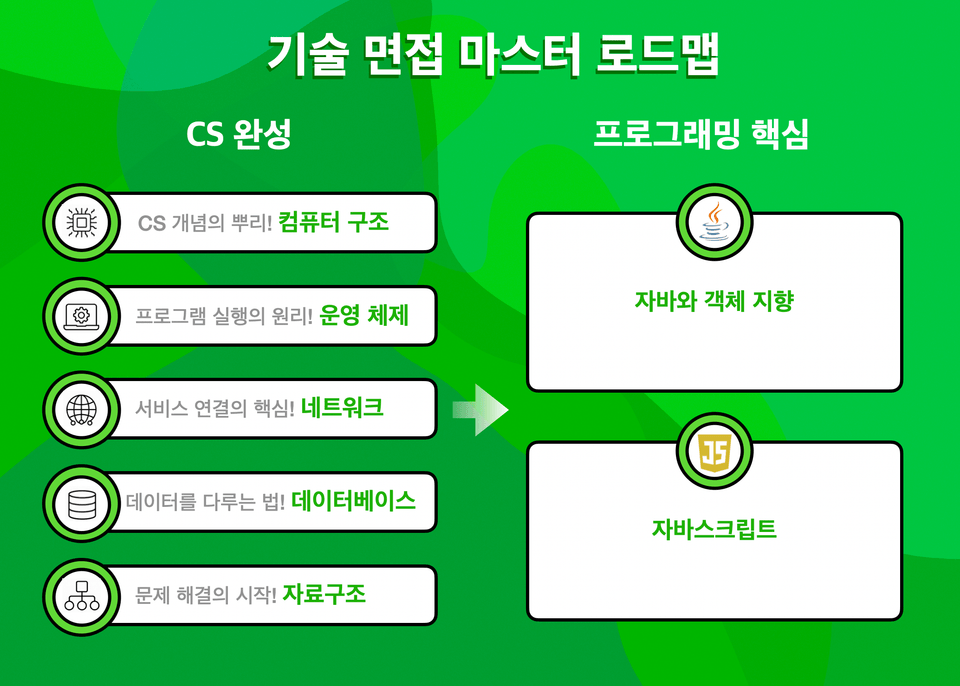
Technical Interview Master Roadmap
Learning materials format provided: PDF
Who is this course right for?
A computer science (CS) beginner who was overwhelmed by the overall structure of networks
Job seekers and career changers who want to quickly organize operating system theory in preparation for technical interviews
Someone who was flustered by questions like "What is DNS?" and "What are the differences between TCP and UDP?"
A beginner who wants to understand the network operation principles from browser request to response like a picture
2,664
Learners
127
Reviews
18
Answers
4.9
Rating
7
Courses
About Me
카카오에서 서버 개발자로 일하며, CS 개념을 빠르게 이해하고
면접에서 말로 풀어낼 수 있도록 돕는 '말이 트이는 CS' 시리즈를 만들고 있습니다.
학력 및 경력
서울대학교 졸업
현 카카오 서버 개발자
강의 철학
컴퓨터 비전공자로 개발을 시작해 CS 기초부터 기술 면접까지 직접 정리하며 시행착오를 많이 겪었습니다. 그 과정에서 쌓인 학습법과 개념 정리 노하우를 바탕으로, 실무와 면접에서 꼭 마주치는 핵심 개념을 그림으로 쉽게 이해할 수 있도록 만드는 콘텐츠를 제작하고 있습니다.
"그때의 저에게 필요했던 강의를 만들고 있습니다."
강의 스타일
핵심만 3~4시간에 압축
도해 중심의 구조적 설명
면접 질문을 기준으로 구성
워크북으로 실전 답변까지 연습
블로그
yiyj1030.tistory.com
→ CS, 알고리즘, 실무 개념을 쉽고 정리하는 기술 블로그 운영 중
Contact
yiyj1030@gmail.com
All
35 lectures ∙ (3hr 50min)
Course Materials:
All
8 reviews
4.9
8 reviews
Reviews 11
∙
Average Rating 4.5
Reviews 9
∙
Average Rating 5.0
Reviews 5
∙
Average Rating 5.0
5
The detailed explanations and abundant visual materials are really very helpful. Please create many more great lectures. Thank you.
Thank you for the course review. I hope this lecture isn't the end and that we can continue the learning journey together. I look forward to seeing you again in the next series :)
Reviews 3
∙
Average Rating 5.0
5
Thank you for the great lecture 😢😢 It was very helpful for preparing for interviews
Thank you for the course review. I hope this lecture isn't the end and that we can continue the learning journey together. I look forward to seeing you again in the next series :)
Reviews 2
∙
Average Rating 5.0
5
Thank you for the course review. I hope this lecture isn't the end and that we can continue the learning journey together. I look forward to seeing you again in the next series :)
Limited time deal ends in 8 days
$357,745.00
29%
$18.70
Check out other courses by the instructor!
Explore other courses in the same field!